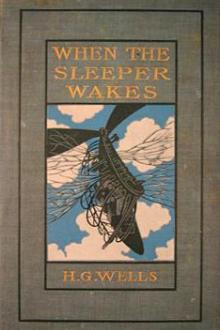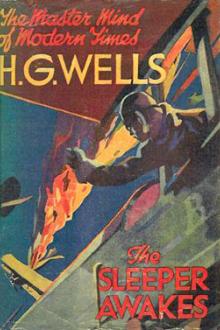When the Sleeper Wakes, H. G. Wells [best electronic book reader .txt] 📗

- Author: H. G. Wells
- Performer: -
Book online «When the Sleeper Wakes, H. G. Wells [best electronic book reader .txt] 📗». Author H. G. Wells
He ended with a florid gesture and turned about. He found the light of his present exaltation reflected in the face of the girl. Their eyes met; her eyes were swimming with tears of enthusiasm. They seemed to be urged towards each other. They clasped hands and stood gripped, facing one another, in an eloquent silence. She whispered. “I knew,” she whispered. “I knew.” He could not speak, he crushed her hand in his. His mind was the theatre of gigantic passions.
The man in yellow was beside them. Neither had noted his coming. He was saying that the southwest wards were marching. “I never expected it so soon,” he cried. “They have done wonders. You must send them a word to help them on their way.”
Graham dropped Helen’s hand and stared at him absent-mindedly. Then with a start he returned to his previous preoccupation about the flying stages.
“Yes,” he said. “That is good, that is good.” He weighed a message. “Tell them; — well done South West.”
He turned his eyes to Helen Wotton again. His face expressed his struggle between conflicting ideas. “We must capture the flying stages,” he explained. “Unless we can do that they will land negroes. At all costs we must prevent that.”
He felt even as he spoke that this was not what had been in his mind before the interruption. He saw a touch of surprise in her eyes. She seemed about to speak and a shrill bell drowned her voice.
It occurred to Graham that she expected him to lead these marching people, that that was the thing he had to do. He made the offer abruptly. He addressed the man in yellow, but he spoke to her. He saw her face respond. “Here I am doing nothing,” he said.
“It is impossible,” protested the man in yellow.
“It is a fight in a warren. Your place is here.”
He explained elaborately. He motioned towards the room where Graham must wait, he insisted no other course was possible. “We must know where you are,” he said. “At any moment a crisis may arise needing your presence and decision. “The room was a luxurious little apartment with news machines and a broken mirror that had once been en rapport with the crow’s nest specula. It seemed a matter of course to Graham that Helen should stop with him.
A picture had drifted through his mind of such a vast dramatic struggle as the masses in the ruins had suggested. But here was no spectacular battle-field such as he imagined. Instead was seclusion — and suspense. It was only as the afternoon wore on that he pieced together a truer picture of the fight that was raging, inaudibly and invisibly, within four miles of him, beneath the Roehampton stage. A strange and unprecedented contest it was, a battle that was a hundred thousand little battles, a battle in a sponge of ways and channels, fought out of sight of sky or sun under the electric glare, fought out in a vast confusion by multitudes untrained in arms, led chiefly by acclamation, multitudes dulled by mindless labour and enervated by the tradition of two hundred years of servile security against multitudes demoralised by lives of venial privilege and sensual indulgence. They had no artillery, no differentiation into this force or that; the only weapon on either side was the little green metal carbine, whose secret manufacture and sudden distribution in enormous quantities had been one of Ostrog’s culminating moves against the Council. Few had had any experience with this weapon, many had never discharged one, many who carried it came unprovided with ammunition; never was wilder firing in the history of warfare. It was a battle of amateurs, a hideous experimental warfare, armed rioters fighting armed rioters, armed rioters swept forward by the words and fury of a song, by the tramping sympathy of their numbers, pouring in countless myriads towards the smaller ways, the disabled lifts, the galleries slippery with blood, the halls and passages choked with smoke, beneath the flying stages, to learn there when retreat was hopeless the ancient mysteries of warfare. And overhead save for a few sharpshooters upon the roof spaces and for a few bands and threads of vapour that multiplied and darkened towards the evening, the day was a clear serenity. Ostrog it seems had no bombs at command and in all the earlier phases of the battle the aeropiles played no part. Not the smallest cloud was there to break the empty brilliance of the sky. It seemed as though it held itself vacant until the aeroplanes should come.
Ever and again there was news of these, drawing nearer, from this Mediterranean port and then that, and presently from the south of France. But of the new guns that Ostrog had made and which were known to be in the city came no news in spite of Graham’s urgency, nor any report of successes from the dense felt of fighting strands about the flying stages. Section after section of the Labour Societies reported itself assembled, reported itself marching, and vanished from knowledge into the labyrinth of that warfare What was happening there? Even the busy ward leaders did not know. In spite of the opening and closing of doors, the hasty messengers, the ringing of bells and the perpetual clitter-clack of recording implements, Graham felt isolated, strangely inactive, inoperative.
Their isolation seemed at times the strangest, the most unexpected of all the things that had happened since his awakening. It had something of the quality of that inactivity that comes in dreams. A tumult, the stupendous realisation of a world struggle between Ostrog and himself, and then this confined quiet little room with its mouthpieces and bells and broken mirror!
Now the door would be closed and they were alone together; they seemed sharply marked off then from all the unprecedented world storm that rushed together without, vividly aware of one another, only concerned with one another. Then the door would open again, messengers would enter, or a sharp bell would stab their quiet privacy, and it was like a window in a well built brightly lit house flung open suddenly to a hurricane. The dark hurry and tumult, the stress and vehemence of the battle rushed in and overwhelmed them. They were no longer persons but mere spectators, mere impressions of a tremendous convulsion. They became unreal even to themselves, miniatures of personality, indescribably small, and the two antagonistic realities, the only realities in being were first the city, that throbbed and roared yonder in a belated frenzy of defence and secondly the aeroplanes hurling inexorably towards them over the round shoulder of the world.
At first their mood had been one of exalted confidence, a great pride had possessed them, a pride in one another for the greatness of the issues they had challenged. At first he had walked the room eloquent with a transitory persuasion of his tremendous destiny. But slowly uneasy intimations of their coming defeat touched his spirit. There came a long period in which they were alone. He changed his theme, became egotistical, spoke of the wonder of his sleep, of the little life of his memories, remote yet minute and clear, like something seen through an inverted opera-glass, and all the brief play of desires and errors that had made his former life. She said little, but the emotion in her face followed the tones in his voice, and it seemed to him he had at last a perfect understanding. He reverted from pure reminiscence to that sense of greatness she imposed upon him. “And through it all, this destiny was before me,” he said; “this vast inheritance of which I did not dream.”
Insensibly their heroic preoccupation with the revolutionary struggle passed to the question of their relationship. He began to question her. She told him of the days before his awakening, spoke with a brief vividness of the girlish dreams that had given a bias to her life, of the incredulous emotions his awakening had aroused. She told him too of a tragic circumstance of her girlhood that had darkened her life, quickened her sense of injustice and opened her heart prematurely to the wider sorrows of the world. For a little time, so far as he was concerned, the great war about them was but the vast ennobling background to these personal things.
In an instant these personal relations were submerged. There came messengers to tell that a great fleet of aeroplanes was rushing between the sky and Avignon. He went to the crystal dial in the corner and assured himself that the thing was so. He went to the chart room and consulted a map to measure the distances of Avignon, New Arawan, and London. He made swift calculations. He went to the room of the Ward Leaders to ask for news of the fight for the stages — and there was no one there. After a time he came back to her.
His face had changed. It had dawned upon him that the struggle was perhaps more than half over, that Ostrog was holding his own, that the arrival of the aeroplanes would mean a panic that might leave him helpless. A chance phrase in the message had given him a glimpse of the reality that came. Each of these soaring giants bore its thousand half savage negroes to the death grapple of the city. Suddenly his humanitarian enthusiasm showed flimsy. Only two of the Ward Leaders were in their room, when presently he repaired thither, the Hall of the Atlas seemed empty. He fancied a change in the bearing of the attendants in the outer rooms. A sombre disillusionment darkened his mind. She looked at him anxiously when he returned to her.
“No news,” he said with an assumed carelessness in answer to her eyes.
Then he was moved to frankness. “Or rather — bad news. We are losing. We are gaining no ground and the aeroplanes draw nearer and nearer.”
He walked the length of the room and turned.
“Unless we can capture those flying stages in the next hour — there will be horrible things. We shall be beaten.
“No!” she said. “We have justice — we have the people. We have God on our side.”
“Ostrog has discipline — he has plans. Do you know, out there just now I felt — . When I heard that these aeroplanes were a stage nearer. I felt as if I were fighting the machinery of fate.”
She made no answer for a while. “We have done right,” she said at last.
He looked at her doubtfully. “We have done what we could. But does this depend upon us? Is it not an older sin, a wider sin?”
“What do you mean?” she asked.
“These blacks are savages, ruled by force, used as force. And they have been under the rule of the whites two hundred years. Is it not a race quarrel? The race sinned — the race pays.”
“But these labourers, these poor people of London — !”
“Vicarious atonement. To stand wrong is to share the guilt.”
She looked keenly at him, astonished at the new aspect he presented.
Without came the shrill ringing of a





Comments (0)